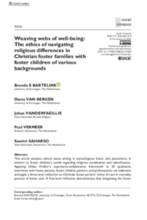This article analyzes ethical issues arising in transreligious foster care placements in relation to foster children’s needs regarding religious socialization and identification. Applying Urban Walker’s expressive-collaborative framework to 30 qualitative interviews with foster parents, foster children, parents, and professionals, the authors elaborate and apply a three-level reflection on Christian foster parents’ ethics of care in everyday practice of foster care.
A first-level reflection demonstrates that integrating the foster child in the foster family often leads to predominant Christian socialization of foster children. A second-level reflection demonstrates asymmetry between foster parents and birth parents in the religious socialization of foster children, leading to confusion for the foster child and (potential) conflict with birth parents. Finally, a normative reflection leads us to conclude that foster children in transreligious placements need loose and hybrid moral frames in which they can alter, shift, and navigate their multiple identifications and partialities as part of their development.

